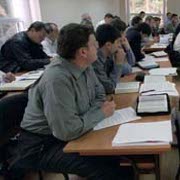 |
| Training for church leaders. (Photo courtesy of Slavic Gospel Assocation) |
Kazakhstan (MNN) ―Leaders in Kazakhstan are looking to lift the state of emergency that was to last through January 31. Things seem to have settled down in the oil-rich town where riots between striking oil workers and security forces claimed over 50 lives in mid-December.
Kazakh President Nursultan Nazarbayev declared the emergency in response to uprisings that took place--a move that was partially aimed at salvaging his image of stability right before elections.
On January 15, voters went to the polls against the backdrop of the smoke of the government crackdowns. The result: two more parties will join Nazarbayev's party in parliament for the first time in 20 years of independence. The new Parliament is slated to open its first session today.
The ruling party Nur Otan took the lions' share--nearly 81% of the votes. Ak Zhol, the Democratic Party garnered nearly 7.5%, and the Communist People's Party brought up the rear with just over 7% of the vote.
However, not everyone was pleased with the results. Opposition leaders organized a modest rally in Almaty denying the legitimacy of the January 15 election that reinforced Nazarbayev's power. Joel Griffith with Slavic Gospel Association' says, "The Organization for Security and Cooperation in Europe issued a statement pretty critical of Kazakh authorities for de-registering parties and candidates at the last minute. They were basically saying that it deprived voters of their choices."
Still, it seems clear that things will remain as they are for now. "President Nazarbayev continues to maintain a fairly firm grip on power, and I don't think we see that changing anytime soon. What will be interesting in the days ahead will be if this continued criticism manages to encourage any further democratic reform."
As with any democratic election process, there's a slim hope that change will result from casting a vote. Toward the end of 2011, the country adopted harsh new restrictions that raised eyebrows among human rights watchdog groups. Griffith says between the same people in power and the trend of the region, that hope appears to have been dashed, especially when couched in security terms. "The reasons given for passing these types of laws are they want to put controls on Muslim extremism."
In reality, Griffith says, "Once these laws go into place, it's the evangelical churches that appear to take the brunt of the crackdown that takes place. It's definitely a situation that bears watching. It's definitely a situation that bears for a lot of prayers. We need to pray for the security and protection of the evangelical churches that are there."
SGA has come alongside evangelical churches in Kazakhstan through a variety of ministries, including support of the Almaty Bible Institute. Griffith says that won't change. "These churches are going to continue their ministry, regardless of what government does. But of course, they'll have to do it in a much more secure, discrete fashion, and we certainly don't want to do anything that would jeopardize their security in any way."
SGA supports children's ministries such as Immanuel's Child, Orphans Reborn, summer camps and national church-planting missionaries. There's more at our Featured Links.
No comments:
Post a Comment